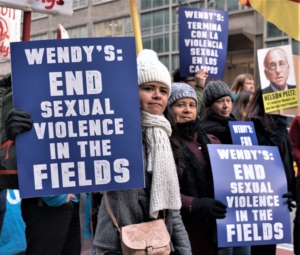
You couldn’t miss them. There were hundreds, and maybe more. Parents with their children. Students and seniors. They had come from California, Florida, North Carolina, Virginia, Texas, Tennessee the Midwest, New England, and Washington, D.C., and New York City. There were ministers and rabbis, there were trade unionists from Canada and even from Turkey.
Holding colorful signs and banners, they wound their way through the streets of midtown Manhattan on March 15, chanting “Boycott Wendy’s!” to the music of a brass band. They had been called here to the caverns of Manhattan’s business center by a farmworkers group, The Coalition of Immokalee Workers. The March 15 demonstration was the culmination of a five-day Freedom Fast of some 100 CIW farmworkers and their families outside the cold steel and glass skyscraper at 280 Park Ave.
What was this about?
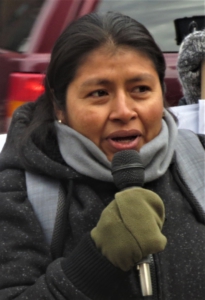
To find out, Liberation News spoke to Julia De La Cruz, an organizer with the Coalition of Immokalee Workers, and a Freedom Faster. De La Cruz is also an outspoken activist against all too common sexual assault and
harassment in the growing fields, crimes perpetuated by field managers with the complicity of farm growers, who do nothing to offer justice to women farm workers.
The Coalition of Immokalee Workers originated in Immokalee, a small, rural farming town not far from Naples, FL. Here, thousands of migrant workers from Haiti, Mexico, Guatemala, and elsewhere, pick 32-pound bushels of tomatoes for 50 cents. These workers include men, women and children, who work in near-slavery conditions, rising as early as 4 am, and not finishing until 7 or 8 pm. But, since 1993, these farmworkers have organizing for better wages and working conditions, demanding a penny more per pound for the tomatoes they pick.
The CIW has since grown in size and strength to include a student-farmworker alliance, an interdenominational network of religious organizations and worldwide recognition for its Fair Food Program, a human rights program created by, monitored by, and enforced by the very workers it’s designed to protect–farmworkers.
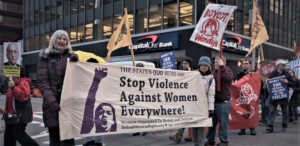
Since it started in 2011, the Fair Food Program has added $11 million to tomato farmworker payrolls in the form of a small premium supermarkets and fast food companies pay to buy only from tomato growers who comply with the Fair Food Code of Conduct. This code includes freedom from physical harassment and threats, physical and sexual assault, child labor, racism, wage and break violations, access to shelter from the sun, access to water, adequate restrooms and hygiene, and a health and safety commission.
Liberation News: Tell me why you’re in New York City.
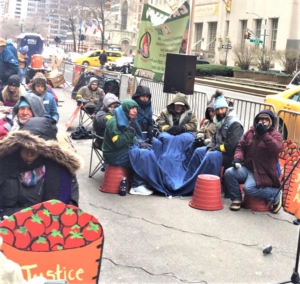
Julia De La Cruz: We are here fighting as a coalition of international workers from Haiti, Guatemala, Mexico, and elsewhere, who work on farms. We are protesting the abuses, working conditions, sexual assault of women, which all go on with impunity. For years, farmworkers and domestic workers have been excluded from employment laws.
LN: What are your demands?
JD: At first, we targeted our campaign towards the farm owners, but after many years of protest and demanding fair wages, we saw that the farmers were powerless to make changes in working conditions and wage increases. But the corporations were the ones with the power to improve our lives. They pay us per bushel, but they charge consumers per pound of tomatoes. No matter how many hours of labor went into getting those tomatoes to markets, even 10-12 hours a day, we only earn $40-50 a day.
This is why we want companies like Wendy’s to adhere to the Fair Food Code of Conduct, which has three basic demands: 1) Stop slave wages, 2) stop the sexual abuse against women, and 3) an end to abuses and slavery in the fields. A lot of time our work is not fully paid. There are nine anti-slavery legal actions in the courts at the moment.
LN: Why are we at 280 Park Avenue?
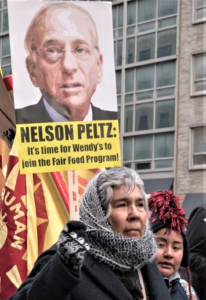
JD: We are here holding a five day hunger strike in front of the management offices of Wendy’s Board of Directors, Nathan Peltz, who has the most power to offer fair wages. Wendy’s headquarters are in Columbus, Ohio, but the Chairman of the Board is Nelson Peltz. [280 Park Ave., is the address of the billion dollar hedge fund Trian Partners where Nathan Peltz is Chief Executive Officer. This week, in addition to the fast and the demonstration, the farmworkers and their supporters delivered 100,000 petition signatures to Peltz supporting the boycott of Wendy’s—JY].
LN: How can the public support the farmworkers’ struggle?
JD: The most powerful forces come from the consumers. Our support base comes from students, faith organizations, and consumers who boycott corporations like Wendy’s which refuses to follow the Fair Food Program.
Find out how you can join the fight for farmworkers’ s rights and the Boycott Wendy’s movement.





